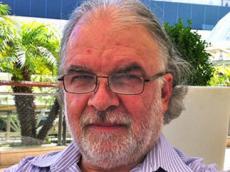|
|
TODAY.AZ / Analytics
Is Europe moving East?
25 April 2014 [16:20] - TODAY.AZ
 The situation in Ukraine today is confusing to say the least. Adding to that confusion is the fact that sometimes the situation is changing by the hour. Analysts, politicians, diplomats and journalists gathered for the 12th edition of the Eurasian Media Forum held in the Kazakh capital, Astana, April 24 and 25 tried over the course of several sessions to try and make sense of what is going on in Ukraine.
The situation in Ukraine today is confusing to say the least. Adding to that confusion is the fact that sometimes the situation is changing by the hour. Analysts, politicians, diplomats and journalists gathered for the 12th edition of the Eurasian Media Forum held in the Kazakh capital, Astana, April 24 and 25 tried over the course of several sessions to try and make sense of what is going on in Ukraine.The answer, in a few words, is that no one really knows what is going on nor do they have any idea on how to manage the crisis nor do they have any idea how to end it. What is however obvious is that the tension that exists now between Russia and the United States and its European allies adds to the already high tension that any expert worth his six-figure salary will tell you is that the situation is getting more dangerous by the day. If the current political crisis was to somehow be hooked up to a gauge, the needle would be now dipping well into the crimson red.
One participant at the Media Forum explained it as such: "The people of Ukraine became tired of 23 years of being governed by a corrupt government." In very oversimplified terms they took their rage to the streets and demanded closer ties with the European Union. This worried and angered Moscow who saw the Western "infringement" on what Moscow considers to be a slow and dangerous expansion of Europe towards Russia.
Many in the West, including the Obama administration, have missed one very important point. Since the end of the Cold War many in the West have treated Russia as a looser rather than to try and integrate Russia in major world affairs specifically when Russia was concerned.
President Barak Obama is not the only one to carry blame for the way things are going today between Washington and Moscow. The previous administration of George W. Bush carries as much culpability.
President Putin spent vast sums of money to make sure that the Sochi Winter Olympics unfolded without a hitch to win some positive points with the international community, but then the very next morning after the Games ended he sent his troops into Crimea blowing out of the water the good will gathered up by the Games.
The rift really is between two very different ways of thinking. On one side stand Western democracies that are trying to promote the notion of Jeffersonian democracy and on the other is the old ways of thinking still employed in Russia.
"The whole reason of politics is not dominance but compromise," said Jeremy Kinsman, a former Canadian ambassador to Moscow.
Moscow chose to use military force and as a result will end up paying the price.
"The world community no longer trusts Russia after is escapade in the Ukraine," said Kinsman. "Anyone who thinks that Russia will not pay huge costs for this is simply delusional."
Russia depends on Europe for about 50 percent of its revenue, whereas Europe depends on Russia for about one percent.
Russia, agreed several participants, is the last country in the world to govern through outdated ways.
"Getting rid of a bad government is a lot easier than building a good government, said Jeremy Kinsman.
--
Claude Salhani is senior editor at Trend Agency in Baku and a political analyst specializing in the Middle East, Central Asia and terrorism. You can follow him on Twitter @claudesalhani
/Trend/
URL: http://www.today.az/news/analytics/133052.html
 Print version
Print version
Views: 2724
Connect with us. Get latest news and updates.
See Also
- 04 February 2026 [08:30]
Is water new gold? Why investors are turning to water companies - 03 February 2026 [13:22]
What President Ilham Aliyev’s Peace Award says about changing global priorities - 03 February 2026 [08:30]
Layoffs without recession: What AI economy is really doing to jobs - 02 February 2026 [20:45]
US moving forces into Middle East - What comes next with Iran? - 02 February 2026 [08:30]
China’s industrial profits edge higher as trade war and structural strains bite - 01 February 2026 [21:40]
Grain, fuel and politics of peace: How trade redrawing Armenia–Azerbaijan relations - 01 February 2026 [17:51]
Zelensky announces new dates for Abu Dhabi talks on Ukraine crisis - 01 February 2026 [14:55]
From sanctions to strategy: Europe joins Washington in confronting Iran - 01 February 2026 [08:30]
How Brussels sabotaging Armenia–Azerbaijan peace process [OPINION] - 30 January 2026 [22:50]
Türkiye, Uzbekistan unite to leave lasting imprint on Turkic world
Most Popular
 US moving forces into Middle East - What comes next with Iran?
US moving forces into Middle East - What comes next with Iran?
 Zangezur corridor become part of TEN-T: European Union is joining fight for South Caucasus
Zangezur corridor become part of TEN-T: European Union is joining fight for South Caucasus
 Pakistan says 48 killed in coordinated attacks in Balochistan
Pakistan says 48 killed in coordinated attacks in Balochistan
 The army is being taken away from Etchmiadzin
The army is being taken away from Etchmiadzin
 Slovakia PM adviser quits after Epstein messages surface in newly released US files
Slovakia PM adviser quits after Epstein messages surface in newly released US files
 Grain, fuel and politics of peace: How trade redrawing Armenia–Azerbaijan relations
Grain, fuel and politics of peace: How trade redrawing Armenia–Azerbaijan relations
 SOCAR, Huawei discuss digital transformation and advanced technologies in oil, gas sector
SOCAR, Huawei discuss digital transformation and advanced technologies in oil, gas sector
